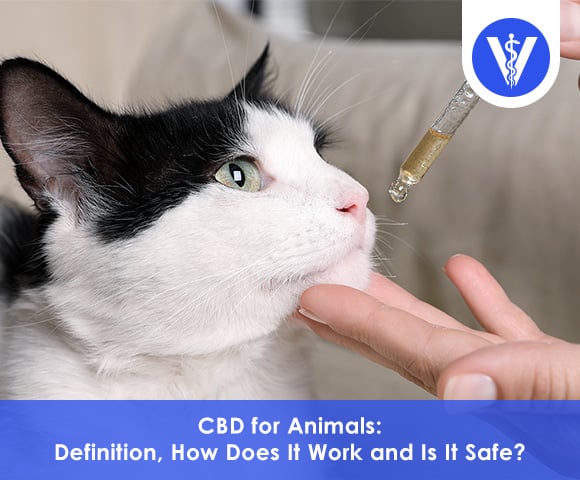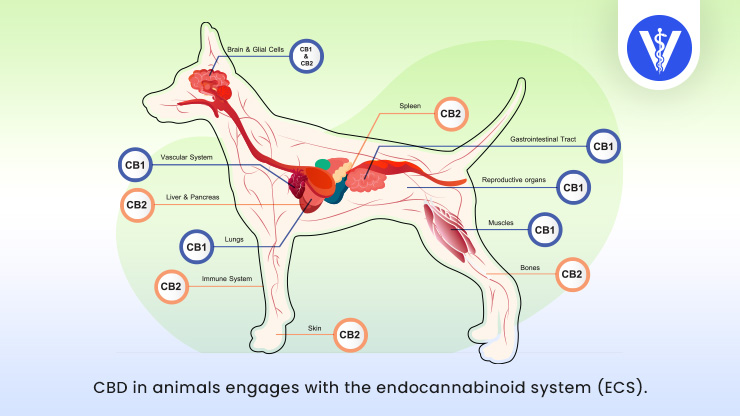CBD for Animals: Definition, How Does It Work and Is It Safe?

Table of Contents
CBD for animals is a hemp-sourced product containing cannabinoids. CBD for pets comes in various forms and works by interacting with the endocannabinoid system (ECS) and naturally supports animal health and well-being.
The ECS is a vast network of receptors, endocannabinoids, and enzymes in the brain and body that regulate critical bodily functions, such as learning, pain response, body temperature, immunity and inflammation control, memory, and sleep.
CBD for pets is safe when used correctly, in the proper form, dose, and frequency. Cat and dog CBD are a mainstream choice for pet owners worldwide. In the United States, 60% of pet owners use CBD for dogs, and 12% use CBD for cats.
The demand for pet CBD outpaces research studies and regulatory changes. Therefore, being familiar with as many details as possible is vital for making informed decisions regarding CBD for animals.
What does CBD for Animals mean?
CBD for animals means it is a plant-based cannabinoid product made from hemp.
The Veterinary Cannabinoid Academy says that cannabis is an umbrella term that covers all plants from the Cannabis sativa genus – including marijuana, hemp, and ruderalis.
Each cannabis plant has its unique cannabinoid profile. There are 113 identified cannabinoids. The most significant cannabinoids are tetrahydrocannabinol (THC) and cannabidiol (CBD).
THC is a psychoactive substance that makes users feel “high” and is toxic to animals, while CBD is a health-boosting compound and is safe for animals.
Marijuana contains THC and CBD. Hemp is rich in CBD and very low in THC. CBD for animal treatments is hemp-based and must have less than 0.3% or no THC. Therefore, when asking what is CBD for animals, the answer is a hemp-sourced product.
CBD for animals helps treat and manage health disorders and diseases, including anxiety, pruritus, epilepsy, and osteoarthritis. CBD is bioavailable, safe and rarely causes any significant side effects.
How Does CBD for Animals Work?
CBD for animals works through the endocannabinoid system (ECS). The ECS is a regulatory system that manages vital body functions like metabolism, pain, sleep, appetite, inflammation, immunity, mood, memory, etc.
The endocannabinoid system is present in all mammals, including humans, and it consists of three elements: Endocannabinoids, endocannabinoid receptors, and enzymes.
CBD interacts with the endocannabinoids, binds with the receptors, and regulates body functions.
This diagram shows how CBD in animals engages with the endocannabinoid system (ECS).

Humans use CBD oil to manage epilepsy, anxiety, insomnia, chronic pain, inflammation, and other health issues. While further research is necessary, using CBD oil in animals to treat similar human ailments may be effective.
The main health benefits of CBD oil for pets and animals are that CBD is a natural treatment and side effects are rare. CBD for animals comes in various forms, from oil and capsules to edible CBD dog treats for anxiety and other ailments. CBD engages with and supports the endocannabinoid system when introduced to the body.
Is CBD Safe for Animals?
Yes, hemp-based CBD is safe for animals (and cannot make your pet “high”).
The World Health Organization (WHO), in its crucial review report of CBD, says that “CBD is generally well-tolerated, with a good safety profile.” Similarly, the Anti-Cruelty Society explains CBD “appears safe to be used on pets.”
What Types of Animals Can Take CBD Oil?
Listed below are the types of animals allowed to take CBD Oil.
- Dogs: CBD is safe, effective, and commonly used to manage several diseases and conditions in dogs.
- Cats: There are no large-scale studies on CBD for cats, though it is considered very safe and beneficial.
- Ferrets: Anecdotal evidence and conclusions derived from other animal studies suggest it is safe to assume that CBD is suitable for ferrets.
- Rodents: The research on rodents indicates CBD is generally safe in rodents like rats, hamsters, guinea pigs, and rabbits.
- Birds: CBD provides birds with many health benefits when used in the right way and in the correct dosage.
What are the Benefits of CBD for Animals?
Listed below are the benefits of pet CBD.
- Natural Option: CBD is a natural product that supports health by working with the body’s endocannabinoid system. Pet CBD is a natural treatment and is suitable for use with other medications and supplements.
- Few Side Effects: CBD for pets has some benign and temporary side effects. Most of them are easy to manage by adjusting the CBD dose.
- Broad Specter of Uses: CBD oil and treats for animals help manage pain, inflammation, and anxiety. CBD products help with sleep and appetite, control seizures, and support the immune system.
- Availability: Pet CBD products are readily available and do not require a veterinary prescription. However, always consult a licensed vet before using CBD for animals.
- Easy Use: CBD oil, treats, and topicals for dogs and other pets are straightforward. Follow the instructions on the product and consult a veterinarian for advice.
What are the Side Effects of CBD for Animals?
Listed below are the CBD side effects for animals.
- Lethargy: Drowsiness or excess relaxation is a common CBD side effect in animals if given in large amounts. Lowering the CBD dosage resolves the idleness generally.
- Dizziness: Dizziness or light-headedness manifests with losing balance, falling, and trouble standing up. Dizziness is usually associated with human CBD products that contain THC. Human products with THC are toxic for animals and can be lethal.
- Dry Mouth: CBD reduces saliva production in animals and causes mouth dryness. Manage dry mouth with easy access to fresh drinking water. Depending on the dog, cat, or animal, this side effect may be short-term or long-term.
- Vomiting: Vomiting occurs due to the CBD content, the carrier oil, or the naturally bitter taste of the product. CBD for animals comes in different flavors to reduce the risk of vomiting and make administration simpler.
- Diarrhea: Diarrhea is the most common side effect and is often the result of the product’s carrier oil rather than the CBD content itself. Switch to another CBD product, using a different carrier, to determine the trigger.
- Upset Stomach: CBD products can upset an animal’s sensitive stomach. Start with a small dose to allow the stomach to adjust to the new product.
- Decreased Liver Enzymes: CBD blocks the production of liver enzymes, changing how particular medications work. Liver enzymes break down drugs, which can result in overdoses if absent.
- Increased Tremors: CBD increases tremors in both people and dogs. Tremors are an unexpected side effect because CBD is a treatment for managing seizures.
- Itchiness: High CBD doses trigger increased itchiness (scratching and biting). Itchiness is a rare side effect that usually decreases by reducing CBD.
- Low Blood Pressure: CBD causes temporary blood pressure drop. The drop is dose-dependent, meaning the drop and side effects of CBD for animals diminish as the amount decreases.
Owners often ask, “What are the side effects of CBD for animals.” Side effects of CBD for animals are possible but rare and benign.
What Kinds of Animal Diseases Can CBD Oil Treat?
The American Veterinary Medical Association (AVMA) states that most information we have about CBD for dogs and other pets comes from “human studies” and “anecdotal or case reports.”
Pet CBD can be used to treat several animal diseases, based on available information.
Listed below are the animal diseases that benefit from pet CBD oil use.
- Osteoarthritis: CBD has anti-pain and anti-inflammatory features and is used to manage osteoarthritis. A Cornell University study found that dogs receiving CBD showed reduced pain and increased mobility. CBD supplements additionally allow for lowering the amount of NSAIDs for pain control.
- Allergies: CBD modulates the immune system and reduces inflammation. Pet CBD decreases the occurrence of pruritus, especially in dogs with atopic dermatitis.
- Seizures: The Food and Drug Administration in the United States (FDA) approved Epidiolex, the first CBD-based drug for epilepsy in humans, in 2018. CBD for pets is safe to use with other anti-seizure medications (ASM).
- Anxiety: CBD alters the brain’s response to serotonin (a feel-good hormone). The effect helps with both situational and behavioral stress.
- Hyperactivity: The anxiolytic features of CBD are beneficial for managing hyperactivity. Animal CBD products promote calmness and relaxation.
- Glaucoma: Cannabinol and cannabigerol reduce intraocular pressure and can benefit pets with glaucoma. Human studies show CBD helps with other ocular conditions, such as diabetic retinopathy and corneal ulcers.
- Cancer: CBD shows promising tumor-shrinking powers. It can also help destroy cancer cells and prevent metastasis. Lastly, it manages nausea – the main side effect of chemotherapy.
What are the Different Forms of CBD Products for Animals?
Animal cannabis products come in six primary forms: oils, treats, capsules, powders, creams, and patches.
Listed below are the different forms of CBD products for animals.
- CBD Oils: CBD oils are liquid products incorporating another oil used as a carrier. They come in dropper bottles and are generally easy to use.
- CBD Treats: CBD treats contain infused CBD and other edibles like peanut butter. CBD treats can also be made at home using high-quality CBD oil and other pet-friendly ingredients.
- CBD Capsules: Capsules are tricky to use in pets. CBD capsules are more challenging to dose and administer.
- CBD Powders: CBD powders are an alternative to oils. Powders are added to the food and usually mix well. Mixing with food is practical for picky eaters that sense the presence of CBD oil in the food.
- CBD Creams: CBD creams are topical products: Creams and balms. CBD topicals are made solely for external applications and are simple to use.
- CBD Patches: Patches are applied to the skin and release CBD ingredients through body heat the skin absorbs. Patches are suitable for outdoor use.
How Can CBD Treat Dogs with Anxiety?
CBD treats dogs with anxiety through its anxiolytic features. Brazilian scientists conducted a study on humans and animals, “Cannabidiol, a Cannabis sativa constituent, as an anxiolytic drug,” in 2012. The study showed that CBD reduces anxiety.
Pet CBD changes the brain’s response to feel-good hormones like serotonin. A study, “Involvement of serotonin-mediated neurotransmission in the dorsal periaqueductal gray matter on cannabidiol chronic effects in panic-like responses in rats,” found a link between CBD and how the brain responds to serotonin.

Cornell University says 83% of dogs given CBD treats before a stressful event decreased anxiety-related behavior.
Frontiers in Veterinary Science published a paper, “A single dose of cannabidiol (CBD) positively influences measures of stress in dogs during separation and car travel,” in 2023. The study showed that CBD reduces stress in dogs during separation and car travel.
A human study, “Cannabidiol in Anxiety and Sleep: A Large Case Series,” demonstrated CBD’s ability to reduce anxiety and improve sleep quality. The study found 79.2% of human anxiety sufferers reported decreased anxiety within one month of using CBD. The same study found 66.7% of people with sleep disorders slept better within one month of using CBD.
The study “Scientific Validation of Cannabidiol Management of Dog and Cat Diseases” reported on pet owners who give CBD to their pets. 50% of pet owners reported improved sleep, and 49% reported decreased anxiety in their pets.
What are the Best 11 CBD Oils for Dog Anxiety?
How Can CBD Treat Dogs with Seizures?
CBD helps dogs with seizures because it has anticonvulsant properties. Life Sciences by Elsevier first described the anti-seizure effects in the 1973 study, “The anticonvulsant activity of cannabidiol and cannabinol.”
Stephanie McGrath, a veterinarian at Colorado State University, published a groundbreaking research on the effects of CBD on epileptic dogs in 2018. She found that CBD products helped control seizures in as much as 89% of epileptic dogs.
Frontiers in Veterinary Science published a study titled “Safety and efficacy of cannabidiol-cannabidiolic acid-rich hemp extract in the treatment of refractory epileptic seizures in dogs” in 2022. The study demonstrated that CBD reduces seizure frequency.
Past and ongoing studies show promising results that CBD for pets helps minimize seizure intensity and frequency.
What are the Best 6 CBD Oils for Dogs with Seizures?
How Can CBD Treat Dogs With Eye Problems?
CBD can treat dogs with eye problems because CBD contains high amounts of vitamin A and beta-carotene. Cannabis features antioxidant and anti-inflammatory properties.
These vitamins and antioxidants found in CBD products promote eye health. At the same time, the anti-inflammatory effect reduces the risk of inflammatory damage.
Sinemyiz Atalay and two collaborators published a study, “Antioxidative and Anti-Inflammatory Properties of Cannabidiol,” in 2022. The study confirmed that CBD has antioxidant and anti-inflammatory features.
Studies suggest CBD holds therapeutic potential for several eye problems. The first study, “Intraocular pressure, ocular toxicity and neurotoxicity after administration of cannabinol or cannabigerol,” was published in 1984. The study results showed that certain cannabinoids can help with glaucoma.
What are the Best 5 CBD Oils for Dogs with Glaucoma?
How Can CBD Treat Dogs With Allergies?
CBD can treat dogs with allergies by modifying the immune system. The immune system causes allergic reactions.
The CBD’s ability to alter the immune system was shown in a 2021 study, “Effect of Cannabidiol (CBD) on Canine Inflammatory Response: An Ex Vivo Study on LPS Stimulated Whole Blood,” published in Veterinary Sciences.
CBD reduces inflammation ( the body’s response to the allergen) and decreases pruritus or itching (the main symptom of dog allergies).
Sumner Burstein wrote a study, “Cannabidiol (CBD) and its analogs: a review of their effects on inflammation,” in 2015. The study showed and explained in length the CBD’s anti-inflammatory effect.
Veterinary Dermatology conducted a study trial, “The effect of a mixed cannabidiol and cannabidiolic acid-based oil on client-owned dogs with atopic dermatitis,” in 2022. The results showed that CBD reduces itchiness.
What are the Best 7 CBD Oils for Dogs with Allergies?
How Can You Measure the Right Amount of CBD Dose for Your Pets?
The recommended CBD amount for pets is between 1 and 5 milligrams per 10 pounds or 4.5 kilograms of body weight. However, the correct dose depends on the pet’s health and underlying reason for using CBD.
Start with the lowest amount recommended for the pet’s body weight and gradually work your way up if necessary.
There are many online dosage calculators that determine the proper CBD dosages for pets. Consulting a veterinarian, however, is always advisable before giving a pet CBD supplements.
What Should you Look at When Buying CBD Products for your Pets?
When buying CBD products for your pets, check the CBD source. Animal CBD must be sourced from hemp (preferably organic) and contain less than 0.3% THC.
Next, inspect the cannabinoid profile. Full-spectrum pet CBD products contain different cannabinoids and additional compounds (flavonoids, terpenes, omega fatty acids) with entourage effects. Broad-spectrum CBD products feature fewer CBDs, and isolates have only one cannabinoid.

Always choose a trustworthy pet CBD brand with a Certificate of Analysis (COA). Third-party laboratories issue the COA after testing and analyzing the product.
A Leafreport study analysis reports that as many as 56% of pet CBD products have incorrect labeling. Many brands falsely claim their pet CBD products cure certain conditions.
Potency is also worth considering: More potent products are better for larger pets. The type of CBD product, like oil or treats, can make administering the dose easier. The flavor is a consideration as CBD for dogs features dog-friendly tastes like chicken or bacon.
What Does the Law Say About the Use of CBD for Animals?
The law about using CBD for animals and pets is constantly changing.
The United States federal government de-scheduled hemp (removed it from the list of controlled substances) in 2018. Hemp CBD products are now legal in all 50 states if they contain less than 0.3% of THC and are for sale as supplements.
Local restrictions, however, vary between states. Cannabis laws are looser, but CBD is still illegal as a pet food ingredient.
The FDA does not approve the use of CBD for pets or animals and classifies it as an “unapproved new animal drug.”
Does the Veterinarian Approve the Use of CBD for Animals Treatments?
No, veterinarians are not legally allowed to recommend or prescribe cannabidiol products or CBD for animals.
Integrative and holistic veterinarians are informed about CBD benefits and can answer pet owner questions.
An American Animal Hospital Association article, “Ready or not, cannabinoids are here,” portrays the current situation vividly and calls for continued clinical research into CDB and animals. A 2018 survey by the VIN News Service showed that at least once a month, 63% of vets receive questions about CBD oil for pets.
Some veterinarians are reluctant to discuss the topic due to insufficient scientific evidence, while others will advise on CBD. Regardless of evolving laws and personal views, vets are able to answer any CBD-related questions, thus helping pet owners make informed decisions.
Is CBD Safe for Dogs?
Yes, when used correctly, hemp CBD is safe for dogs.
Colorado State University published a study paper, “A Report of Adverse Effects Associated With the Administration of Cannabidiol in Healthy Dogs,” in 2018. The study concluded that “CBD is a well-tolerated supplement.”
The National Center for Biotechnology Information issued a study, “Single-Dose Pharmacokinetics and Preliminary Safety Assessment with Use of CBD-Rich Hemp Nutraceutical in Healthy Dogs and Cats,” in 2019. The scientists found that CBD is safe for pets.
Is CBD Approved for the Anti-Cruelty Society?
Yes, the Anti-Cruelty Society has used CBD oil, usually to manage anxiety issues. The society actively collaborates with its veterinarian and monitors the effects of CBD on animals.
















